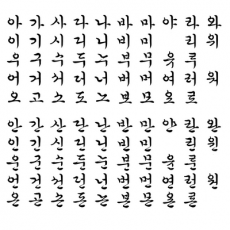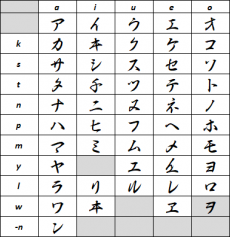User:Masako/pataka: Difference between revisions
m (→syllables) |
m (→lexicon) |
||
| Line 324: | Line 324: | ||
* ''v'' - verb | * ''v'' - verb | ||
{{col-end}} | {{col-end}} | ||
= phrasebook = | = phrasebook = | ||
Revision as of 04:40, 5 March 2021
intro
Kalo is intended to be a minimalist artlang, not an auxlang. It draws primarily on vocabulary from the five most spoken languages in the world; Mandarin, Spanish, English, and Arabic (Hindi is used sparingly although it is spoken by more speakers than Arabic). The grammar is mostly isolating with very few elements of inflection, mostly to show plurality or possession.
Kalo is NOT meant to mimic, replace, or be inspired by Toki Pona or any IAL. Any similarities are based on design aesthetic coincidences and the minimalist nature of the language.
phonology
kalo has nine consonants (/p, t, k, s, m, n, l, j, w/) and five vowels (/a, e, i, o, u/). Stress is word final.
consonants
| Labial | Coronal | Dorsal | |
|---|---|---|---|
| Nasal | m | n | |
| Plosive | p | t | k |
| Fricative | s | ||
| Approximant | w | l | j (y) |
vowels
| Vowels | Front | Back |
|---|---|---|
| Close | i | u |
| Mid | e | o |
| Open | a | |
diphthongs
There are two diphthongs [ai̯] ai, and [au̯] au. These are rare and typically only occur word-finally.
syllable structure
All syllables are of the form (C)V(N), that is, optional consonant + vowel + optional final nasal, or V, CV, VN, CVN.
phonotactics
A few syllables sequences are disallowed; /ji, wu, wo/. Also, a syllable-final nasal may not occur before /m/ or /n/ in the same root.
syllables
| a | ka | sa | ta | na | pa | ma | ya | la | wa |
|---|---|---|---|---|---|---|---|---|---|
| i | ki | si | ti | ni | pi | mi | li | wi | |
| u | ku | su | tu | nu | pu | mu | yu | lu | |
| e | ke | se | te | ne | pe | me | ye | le | we |
| o | ko | so | to | no | po | mo | yo | lo |
| a | ka | sa | ta | na | pa | ma | ya | la | wa |
|---|---|---|---|---|---|---|---|---|---|
| i | ki | si | ti | ni | pi | mi | li | wi | |
| u | ku | su | tu | nu | pu | mu | yu | lu |
writing
If desired, an adaptation of Hangul may be used to write Kalo.
- ㄱ ㄴ ㄷ ㄹ ㅁ ㅂ ㅅ ㅇ
- k n t l m p s -
- ㅏ ㅑ ㅓ ㅕ ㅗ ㅘ ㅛ ㅜ ㅝ ㅟ ㅠ ㅡ ㅣ
- a ya e ye o wa yo u we wi yu - i
Examples
- 와로 너 고머 사
- walo ne kome sa
- 1pl NEG eat FUT
- We will not eat.
allophony
The nasal at the end of a syllable can be pronounced as any nasal stop, though it is normally assimilated to the following consonant. That is, it typically occurs as an [n] before /t/ or /s/, as an [m] before /p/, as an [ŋ] before /k/, and as an [ɲ] before /j/. Because of its small phoneme inventory, kalo allows for quite a lot of allophonic variation. For example, /p t k/ may be pronounced [b d ɡ] as well as [p t k], /s/ as [z] or [ʃ] as well as [s], /l/ as [ɾ] as well as [l], and vowels may be either long or short. Both its sound inventory and phonotactics (patterns of possible sound combinations) are found in the majority of human languages and are therefore readily accessible.
Syntax
Classical Arabic is primarily VSO, but MSA (Modern Standard Arabic) tends to be SVO, favoring full agreement over partial. Chinese is classified as an SVO language. Transitive verbs precede their objects in typical simple clauses, while the subject precedes the verb. Spanish unmarked word order for affirmative declarative sentences is SVO; however, as in other Romance languages, in practice, word order is mostly variable. English word order is almost exclusively SVO. Hindi is primarily an SOV language.
Based on the above information about the main source languages for Kalo, it is primarily an SVO (subject-verb-object) language. Modifiers generally follow what they modify, as do prepositional phrases and subordinate clauses.
- wa kome - 1S eat - I eat. (SV)
- wa amo ko - 1S love 3S - I love her. (SVO)
- o mala amo - DO woman love - The woman is loved. (OV)
questions
The interrogative particle ma (taken from Chinese (嗎) is used in conjunction with various nouns, adverbs, and adjectives to form specific questions.
non-polar questions
|
|
polar questions
Any statement can become a polar question by adding the interrogative particle ma at the end of the sentence.
|
|
Nouns
Nouns only decline for number and possession. They are altered with -lo to show plurality, and possessiveness with -yo.
pronouns
kalo has three basic pronouns; wa [1sg], ni [2sg], and ko [3sg]. These do not indicate gender. These can be made plural using the suffix "-lo", and possessive with "-yo".
| singular | plural | possessive | |
|---|---|---|---|
| 1st person | wa I; me |
walo we; us |
wayo my; mine; our(s) |
| 2nd person | ni you |
nilo you (all) |
niyo your(s) |
| 3rd person | ko he; she; him; her; it |
kolo they; them; those |
koyo their(s) |
- walo wite ni - 1pl see 2s - We see you.
- kolo ne kono wa - 3pl NEG know 1s - They don't know me.
Verbs
Verbs do not change and are only ever modified by particles. There are three basic tenses in Kalo, past, present, and future. The simple present is not marked, the past is marked by le from the Chinese particle (了), and the future is marked by sa from the Arabic construction (سَـ).
| tense/mood | particle | example | translation |
|---|---|---|---|
| present | - | wa ila | I go |
| past | le | wa ila le | I went |
| future | sa | wa ila sa | I will go |
| conditional | kisa | wa ila kisa | I would go |
- wa kome le - 1s eat PST - I ate.
- aki koyo kome - brother 3sg.GEN eat - His brother eats/is eating.
- nilo ne wite sa ko - 2pl NEG see FUT 3sg - You all will not see her.
Uncertainty is marked by ki, kisa, or kile. These are taken from Spanish (quizá) and used across the three basic tenses. It can also act as a subordinating conjunction, and conditional constructions, “if, whether”. It is also used to express possibility or probability.
- tela wa ki ni wite ko - tell 1s if 2s see 3s - Tell me if you can see her.
- ki ni amo yawe te pu yuma ne inpo - if 2sg like weather of today NEG important - Whether you like today’s weather does not matter.
- kisa pu yuma yuwa - maybe this day rain - It may rain (later) today.
positional verbs
Kalo does not use prepositions, but instead uses positional verbs as auxiliaries. These are also used as temporal adverbs in certain situations.
- yu - in; at; within; inside; during; between | from (于)
- ila - be toward; at; in the direction of; go; walk; travel | from (إلى)
Particles
determiners
Determiners in kalo precede the noun they modify.
deixis
- pu - this; these
- su - that; those
amount
- aku - many; much (one hundred)
- kula - all; every; each
- ne - no; none; zero
- poka - some; several; a few
- meno - less; fewer / few; a little
- maso - more
other-ness
- asi - such
- ayo - whichever; whatever
- oto - other
- tonye - same
Number
| Kalo | number | English | Kalo | number | English |
|---|---|---|---|---|---|
| sunya | 0 | zero | na | 7 | seven |
| wa | 1 | one | pa | 8 | eight |
| li | 2 | two | nun | 9 | nine |
| san | 3 | three | ye | 10 | ten |
| si | 4 | four | aku / -ku | 100 | (one) hundred |
| pen | 5 | five | mila | 1000 | (one) thousand |
| we | 6 | six |
When numbers one through ten occur independently, the indicator "ke" precedes the number.
- ko yo le o kasa ke li
- 3s have PST O house NUM two
- She had two houses.
- wa wite o nano ke si
- 1s see O man NUM four
- I see four men.
Higher Numbers
- yewa - 11; eleven
- yeli - 12; twelve
- liye - 20; twenty
- liyesi - 24; twenty-four
- kuyeli - 112; one-hundred-twelve
- sankuweyepen - 365; three-hundred-sixty-five
lexicon
The working lexicon for Kalo.
|
|
|
phrasebook
- wikitravel.org/en/Spanish_phrasebook
- en.wiktionary.org/wiki/Category:Phrasebooks_by_language
Essentials
- ola - Used for "hello; goodbye; farewell; welcome" (analogous to aloha)
- kan/a - "yes; it is"
- ne - "no; it is not"
- yapu wa - "Excuse me."
- nenka ma - "Please." [lit: is (it) possible?]
- by extension "Do you mind?"
- tanka (ta) - "Thank you (very much)."
- tipa - "(That's) OK."
Greetings & Goodbyes
- ola yuma - "Good morning/day/afternoon"
- ola note - "Good evening/night"
- salama - "Hey/Hi/Hello/Bye"
Civilities
- moto (niyo) ma - manner 2s.POSS Q - How are you?
- tipa - "Good/OK/Fine."
- ... - "Not bad."
- tenpo ta ne wite - time big no see - Long time no see

